National Student Accommodation Survey 2023 – Results
UPDATE: View our 2024 National Student Accommodation Survey.
With the energy crisis, student housing shortage and extortionate rents, this year's National Student Accommodation Survey reveals the immense challenges students are facing.
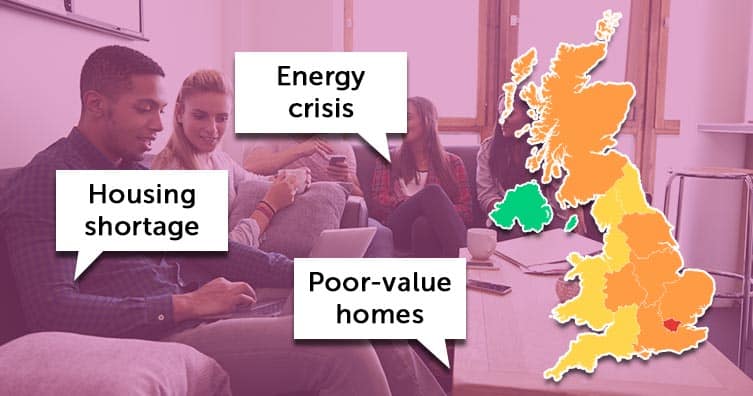
Credit: Monkey Business Images – Shutterstock
Now in its seventh year, our 2023 survey received over 1,800 responses and paints a grim picture of the current state of student accommodation in the UK.
Energy bills are at an all-time high, yet the government continues to offer shockingly little financial support to students.
Of those in the survey that believed they should have been entitled to the £400 discount on energy bills, over half said they haven't received it. This is despite 95% of students with bills worrying about keeping up with the payments.
The government urgently needs to address this situation. Until students are offered effective support to help with accommodation costs, they will continue to struggle throughout the cost of living crisis.
What's in this report?
Key findings
Here's an overview of the key findings from the National Student Accommodation Survey 2023:
- Energy bills cost an average of £85 per month for students, which is an increase of £276 per year compared to the 2022 survey.
- The vast majority of students in halls and around half of those with private landlords have not benefitted from the £400 discount on energy bills.
- £535 is the average monthly rent for students (in London the average is £663).
- Half of the students in the survey are worried about the student housing shortage crisis.
- Two in five have thought about dropping out of university due to rent or bills.
- The proportion of student tenants struggling with rent has increased since the 2022 survey, up from 53% to 63%.
- Students are receiving less money from their parents than in previous years for rent, now getting around £34 per week.
- 72% say their health is affected by rental costs.
Expert comment
Save the Student's money expert, Tom Allingham, says:
The impact of record energy prices on students' bills is clear. But what's even more alarming is just how many have been unable to benefit from the government's £400 energy bill discount.
The government repeatedly claimed that every household in the country would receive this funding from one of its schemes. But, evidently, this has not been the case.
While many people in similar forms of accommodation, such as care homes, have received the funding, 82% of students in university halls have not.
Given that rent in at least some halls will inevitably have increased to cover rising energy costs, it's concerning that many students haven't received the necessary support in return.
Factor in the wider cost of living crisis, plus the fact that nearly half of students in privately rented homes also missed out on the energy grant, and it’s sadly no surprise that 63% now say they're struggling with rent.
We're calling on the government to stop overlooking students, and instead ensure that they can benefit from all energy bill support – both now and in the future.
Where do students live during term time?
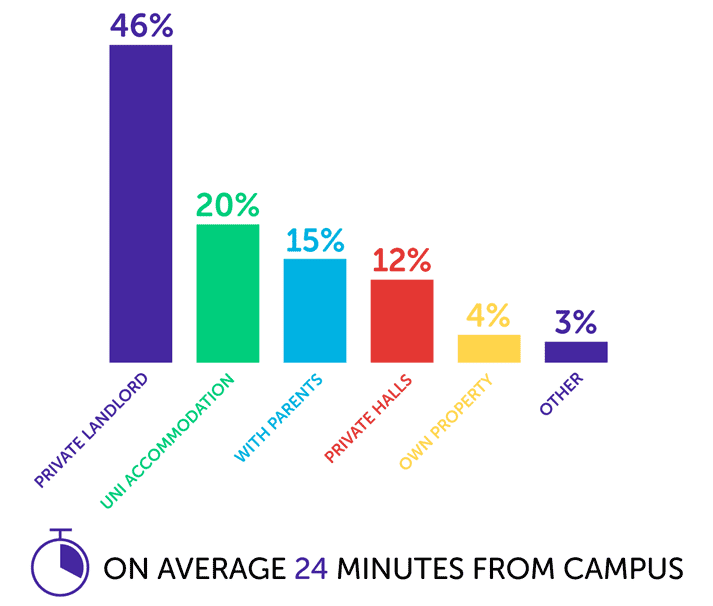
There has been a noticeable shift in students' accommodation choices compared to the 2022 survey.
For starters, we've seen an increase in the proportion of students renting from private landlords. In the 2022 survey, 40% of students said they rented from private landlords, but this has increased to 46% this year.
Alongside this, there has been a rise in the proportion of students living with parents or guardians, up from 13% last year to 15% this year.
And, not only are we seeing a change in the type of properties students choose to live in, but there has also been a slight increase in the average time it takes students to get to campus.
In the previous three accommodation surveys, we found it took students an average of 21 minutes to get to campus from their term-time homes. However, this has increased to 24 minutes in this year's survey.
The changes in accommodation choices are particularly noticeable among first years, as this table shows:
| Where first-year students live | 2022 survey | 2023 survey | Difference (percentage points) |
|---|---|---|---|
| University halls | 53% | 41% | - 12 |
| Private landlord | 13% | 19% | + 6 |
| With parents/guardians | 12% | 18% | + 6 |
| Private halls | 13% | 15% | + 2 |
| Other | 5% | 3% | - 2 |
| Own property | 4% | 4% | + 0 |
As we'll discuss in more detail later, properties with private landlords generally have lower rents than student halls (either private or university-run).
The houses and flats are also likely to be cheaper if they're further away from campus, perhaps explaining why the average time it takes students to get to uni from their homes has increased.
And, for students who have the option to live with their parents or guardians, this would usually be the cheapest option.
As such, the rise in the proportions of students choosing to rent from private landlords or commute from home could be reflective of the growing financial challenges students are facing in the cost of living crisis.
The student housing shortage crisis
It's been widely covered in the media that the UK is facing a student housing shortage, particularly in cities such as Durham, Glasgow and York.
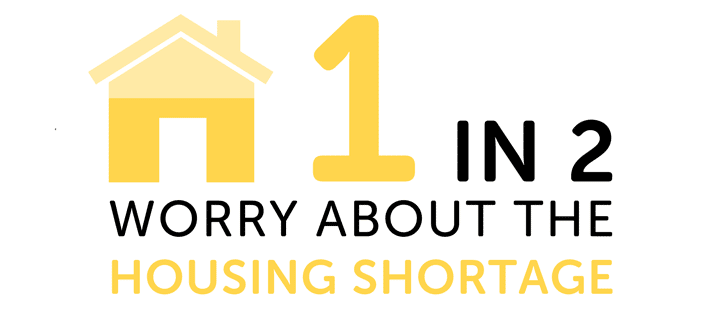
And it's clearly a concern that's on the minds of a lot of students. 50% of students in the survey said they are worried about the housing shortage.
Here's what students told us about how the crisis is impacting them:
- Right now, finding second year housing is extremely difficult. Everything is too expensive and there aren't a lot of properties available. (Uni accommodation)
- Leeds housing rent market for students has more houses than students so I think we have not and will not see the crazy hikes seen recently in Durham or other places. (Private landlord)
- [I'm] struggling to find affordable accommodation for next year and don't know if I'll be able to find any I can afford to continue my studies. (Private landlord)
- I have been lucky enough to extend my tenency for the next year but I've been on the phone with friends in other cities having panic attacks because houses they apply for keep getting bought out and they're scared they're going to have to drop out. (Private halls)
- I am affected by the crises, so I have had to travel three hours to school and three hours back daily. I have finally gotten accommodation for the next term but it has really impacted my physical and mental health. (With parents/guardians)
- I'm graduating this year, which I'm very glad about in the context of the housing crisis in Durham. This year people were signing houses in October, often without having looked at them first. And the housing prices have risen to unreasonable amounts. (Private landlord)
When do students look for accommodation?
Here's an overview of when students start looking for accommodation:
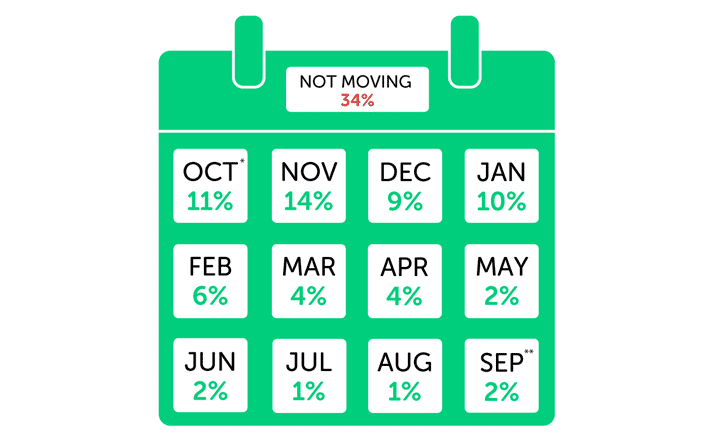
* Students who answered 'before November'.
** Students who answered 'after August'.
Due to the student housing shortage, we looked into whether students were looking for accommodation earlier than usual. But, on the whole, this doesn't seem to be the case.
25% of students in the survey said they had started looking before December. This compares to 24% who said the same in the 2022 survey and 25% in 2021, so there hasn't been a noticeable change.
Have students signed rental contracts for 2023/24 yet?
When we asked students in the survey whether they have signed their next rental contract yet, this is what they said:
- 42% – Haven't signed their next contract, but will do
- 32% – Haven't signed their next contract, and aren't planning to
- 26% – Have signed their next contract.
Just as we haven't seen a noticeable change in when students are looking for accommodation due to the housing shortage, there has also been very little difference in when students are signing their next tenancy contract.
In the 2022 survey, 41% said they hadn't signed their next contract but planned to, 33% said they hadn't and didn't plan to, and 26% said they had signed it. This is almost identical to this year's results.
How much does student accommodation cost?
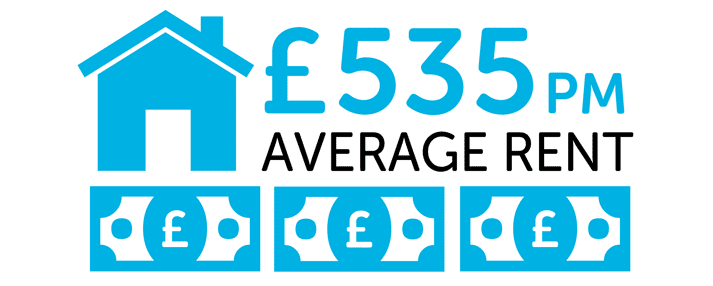
Among students that pay rent, it costs them an average of £535 per month.
But, as would be expected, the amount students spend on rent can vary widely depending on where in the UK they study.
Student rent in each region of the UK
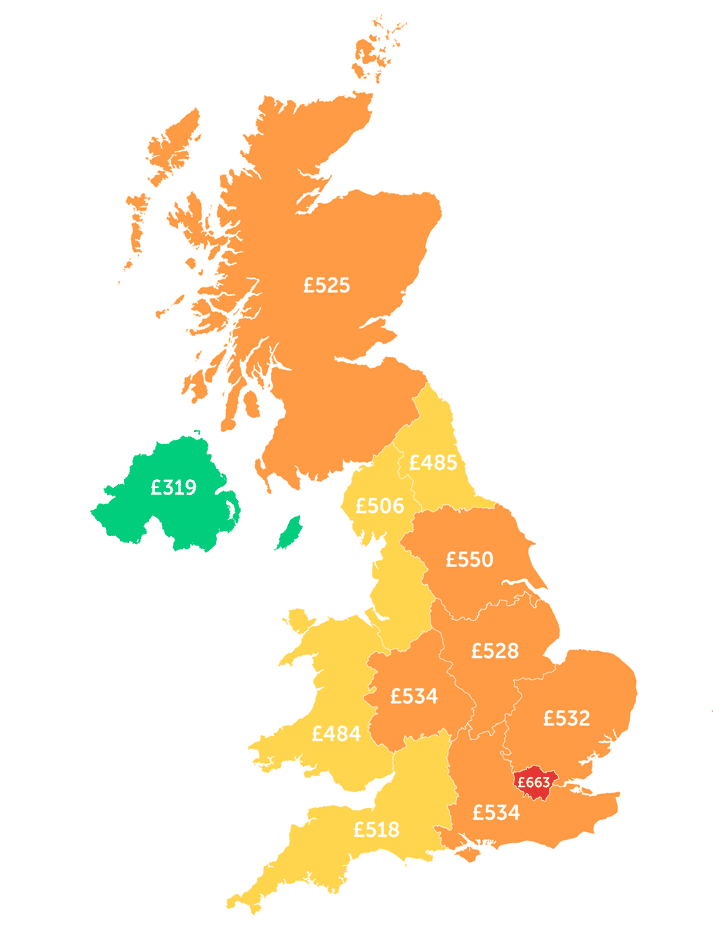
London has the most expensive student rent in the UK by far, costing an average of £663 per month. This is over £100 more a month than the next most expensive region, which is Yorkshire (£550 per month).
Northern Ireland, on the other hand, has significantly cheaper rent for students, costing an average of £319 per month.
As rent is usually the biggest monthly expense for students, the high cost – especially in areas like London – can be immensely challenging for many to keep up with.
In fact, 10% of students in the survey said they were in rent arrears, owing an average of £409.
Here are some of the comments we received from students in the survey about renting:
- Rent is expensive and I can't afford it. I feel like the accommodation isn't the same as advertised and it's over priced. This has caused my health to suffer. I have considered dropping out of uni so I can be released from my contract. (Private halls)
- My arrears make me think about leaving the university so I can search for jobs. (Uni accommodation)
- I'm currently staying with friends whilst trying to find accommodation. I can't stay with them forever but nowhere affordable has come up and that's before you even consider bills on top of the rents advertised. It's my final year which is why I pushed to stay in uni rather than drop out. (Other)
- Student accommodation is way too expensive for what you get. It makes uni more stressful than it already is. (Private landlord)
- Rent takes up most of my Maintenance Loan and I'm on placement year working full time for free for the NHS so it's very difficult to work a side job on top of that to be able to afford living costs on top of rent, so I'm constantly wondering if it's worth it to stay at uni. (Uni accommodation)
- I have been struggling to keep up with living costs and have been missing weeks of uni to work on a building site just so I can afford rent and food. (Private landlord)
- The cost of rent is extortionate. I planned for this when I thought about going to uni, it's budgeted for me and I know how much I need to work to keep up money but it's still hanging over me. (Private halls)
- Next year I am moving home and commuting as I cannot afford rent. (Uni accommodation)
Which accommodation is the cheapest?
Among students in the survey who rent, those with private landlords are paying less each month on average compared to those in private or university-run halls.
| Accommodation type | Average monthly rent |
|---|---|
| Private landlord | £523 |
| Uni accommodation | £592 |
| Private halls | £596 |
As we mentioned earlier, we have seen a drop in the proportion of students living in halls (including first-year students). If students are able to save money by renting from landlords or living with their parents or guardians, it's not surprising that many will choose these options.
What do students get for their money?
We asked students what, if anything, was included in their rent. Here's what they said:
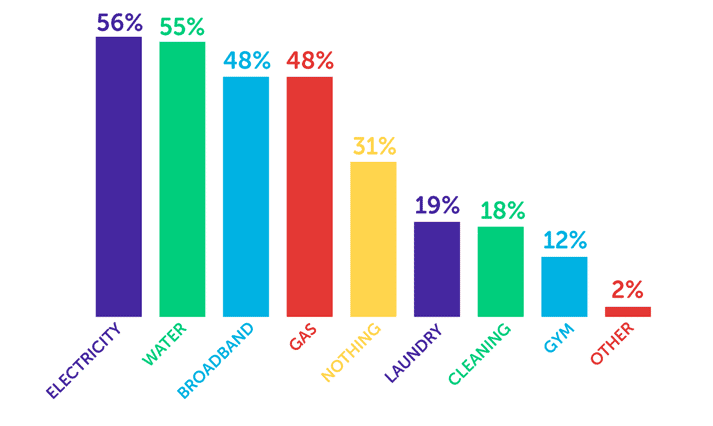
Over two-thirds of students (69%) in the survey have at least one of the above things included in their rent.
Electricity and water bills are the most common extras included in rent, followed closely by broadband and gas.
What else do students need to pay for?
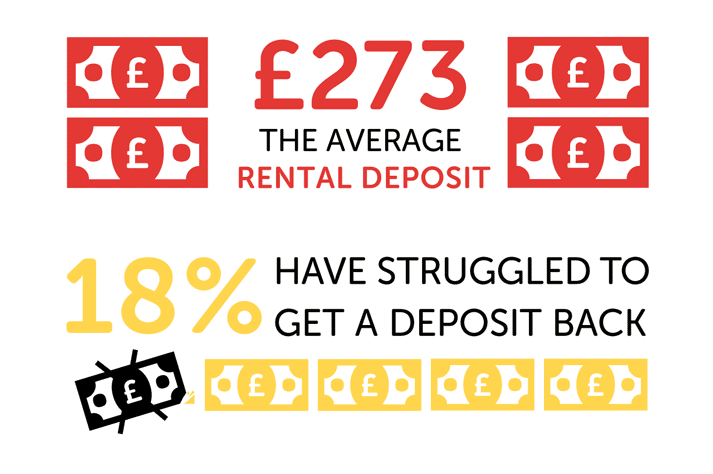
With the average student spending £273 on a rental deposit, it's worrying that nearly one in five said they have struggled to get a deposit back in the past.
More worrying still is that 25% of students in the survey didn't read their tenancy agreement before signing it. Broken down, this includes 8% who said their friends/housemates read the contract, 11% who said their parents did, and 6% who said nobody did.
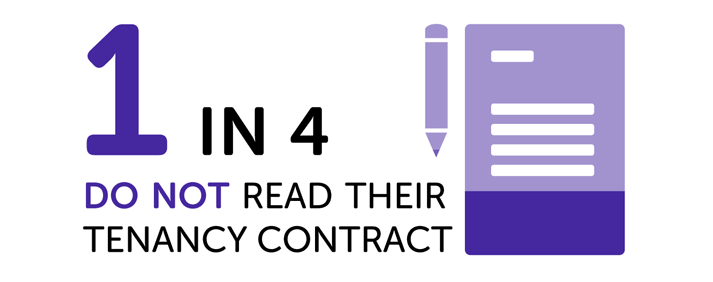
We would always encourage students to read their own tenancy agreement before signing it. By doing so, they can ensure they're aware of the full terms of the contract and reduce the risk of losing their deposit after moving out.
Is student accommodation affordable?
For too many students, rent is not affordable.
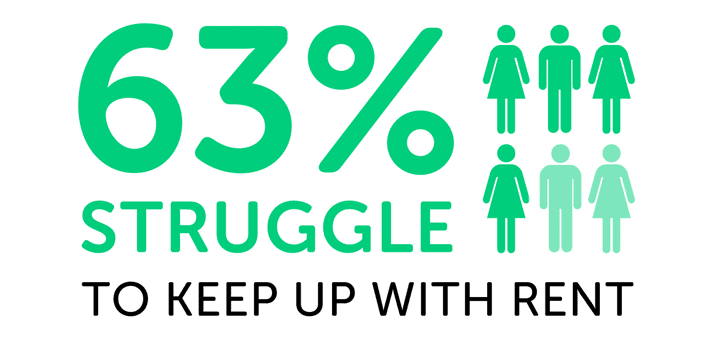
18% of students in the survey who pay rent described keeping up with the payments as a constant struggle, while a further 45% said they struggle from time to time. This, combined, means that over three in five students are struggling to keep up with rent, at least some of the time.
Impact of accommodation costs on students
Worryingly, 41% said they have thought about dropping out of university because of either rent or bills. Rent, in particular, is leading a concerning proportion of students to wonder if they can continue with their studies.
Here's a breakdown of what students said when we asked if they have thought about dropping out due to rent or bills:
| Have students considered dropping out? | Rent | Bills |
|---|---|---|
| Yes - thought about it | 38% | 28% |
| Yes - have dropped out | 4% | 3% |
| No | 58% | 69% |
It's clear that the cost of accommodation can have a significant impact on students' lives.
In the survey, we asked students whether accommodation issues impact their health or abilities to study.
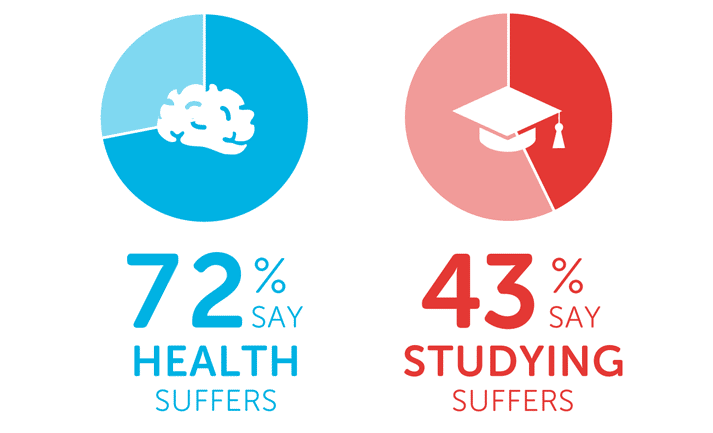
Among students in the survey who have had problems with their accommodation, 43% said their studies were impacted.
As well as this, 72% of students said their physical and/or mental health is affected by rental costs.
In terms of physical health, 10% said theirs is greatly affected, and 39% said theirs is somewhat affected.
Mental health, however, is more likely to be impacted by the cost of renting. 17% said theirs is greatly affected, while 50% said theirs is somewhat affected.
Here are some comments from students in the survey about how renting affects their health and studies:
- Sofa surfing with a chronic musculoskeletal syndrome affects my physical health, and lack of personal space has severely affected my mental health. Though I am grateful, because the shelter I lived in had worse living conditions, I am still finding it quite hard. (Other)
- Finding a place every year that is in my budget [is] very stressful and I really hate it. As I don't want to do it anymore [I] have thought about dropping out but will probably carry on and do it again for next year, I suppose. It's exhausting. (Private landlord)
- I am withdrawing temporarily from studies due to mental health struggles which are partly worsened by living costs, but I cannot move back in with parents so I will continue to pay my rent and bills. (Private landlord)
- The money struggle and cost of living has us all stressed about continuing to afford rent. (Private landlord)
- My Student Loan doesn't cover the cost of my accommodation let alone money to live off therefore I am constantly working to try to get enough money to pay my rent and to buy food, etc. This then leaves me exhausted and makes focusing on my degree difficult as my main concern is surviving. (Private halls)
- Financial struggles have caused me a lot of anxiety and have worsened my mental health disorders. (With parents/guardians)
Students and the energy crisis
With energy prices at an all-time high, many people in the UK, including students, are struggling with the rising prices.

The average amount student bill payers spend on energy is £85 per month. This is a 37% increase since last year, when students were paying an average of £62 per month.
The increase in energy bills, which works out as a rise of £276 per year, is causing many to struggle to keep up with bills.
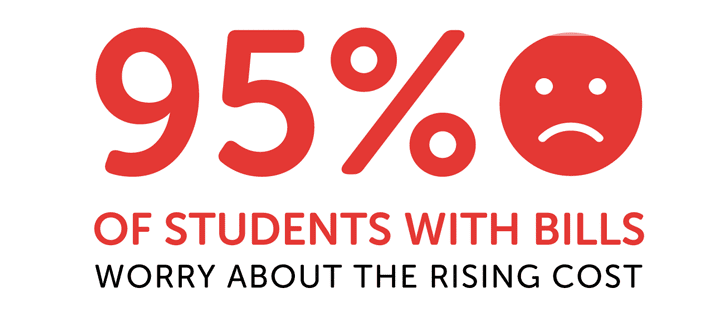
Among students in the survey that pay bills, nearly all (95%) worry about the rising cost.
On top of this, 22% of student bill payers describe it as a constant struggle, while 42% struggle from time to time.
As a result, students are making changes to cut back on energy bills:
| Ways to use less energy | How many students have done this? |
|---|---|
| Not put the heating on | 52% |
| Stayed in bed longer than usual to stay warm | 50% |
| Had shorter/fewer showers | 38% |
| Spent longer at uni to avoid using electricity/gas at home | 35% |
| Asked housemates to use less electricity/gas | 34% |
| Not cooked as often | 26% |
| Used an electric blanket | 13% |
| Asked landlord to improve insulation | 10% |
Likely due to the rising cost of bills, students are generally using the heating less. In last year's survey, students kept their heating on for an average of nine hours a day. This year, it has dropped to seven hours a day.
This ties into the second most common way students have cut down on energy usage: staying in bed longer than usual to stay warm. Half of the students in the survey said they have done this, giving an indication of how many have been living in cold homes over winter.
As well as reducing their energy usage at home, many are also making cutbacks in other areas of life to afford their bills:
| Spending category | How many cut back on spending? |
|---|---|
| Clothes and shopping | 61% |
| Takeaways and eating out | 58% |
| Socialising | 56% |
| Groceries | 47% |
| Holidays and events | 45% |
| Travel | 39% |
| Gifts and charity | 37% |
| Health and wellbeing | 36% |
| Study materials | 22% |
| Mobile phone | 20% |
| None | 19% |
It's worrying to see some students spending less on daily essentials, such as groceries. The proportion of students making cutbacks in this area of spending has increased since last year.
In the 2022 survey, 43% said they cut back on groceries due to bills. This year, it has increased to 47%.
Our latest National Student Money Survey (published September 2022) found that one in 10 students had used a food bank in the previous academic year. With this in mind, it's extremely concerning to think of yet more students spending less on food to deal with the energy crisis.
During this financially challenging time, we hoped the government would do more to support students.
Of course, the government has offered a support package to the majority of households in Britain – in particular, the £400 discount on energy bills. But, unfortunately, the living situations of many students mean that not all can access this help.
The government's support package
Of those in the survey who believed they should have received the £400 discount on energy bills, 56% told us they hadn't.
There are two key issues that are preventing students from accessing the support:
- Students who live in halls are not generally eligible for the £400 discount.
- When students rent from private landlords and have bills included in their rent, their landlord is unlikely to pass the discount on to them.
82% of students who live in university halls and 70% of those in private halls said they have not received the £400 discount.
Among students who rent from landlords, 47% said they haven't received the discount. If we look specifically at students who rent from landlords and have bills included in their rent, the figure increases to 78%.
Here's what students say about the realities of keeping up with bill payments at university:
- The amount of hours I have to study being in final year and the amount of money I have to make each month to pay the bills is draining. (Private landlord)
- It's ridiculous that I am constantly ill due to the fact that it is extremely expensive to turn on the heating, that barely works anyway. Furthermore my landlord for whatever reason cannot tell me if I have overstretched my energy allowance and how much it will cost if I go over it so I could owe them whatever number they feel is correct and I would have no way to dispute this. (Private landlord)
- The cost of bills has absolutely sky rocketed. I went from a house with bills included to the landlord turning round and stopping bills-included contracts because of the cost of living. (Private landlord)
- I feel like the bills are extortionate. If I'd have known, I would have gone to a uni closer to home and lived there intead. My Maintenance Loan nowhere covers the rent, so I have no option other than for my parents to pay for it. (Private landlord)
- We've had to have friends over who can't afford heating so they can stay over for a warm night's sleep. (Private landlord)
How students pay for their rent
With 63% of students struggling to afford rent, where are they getting the money from to cover it?
We asked students in the survey if they need to borrow money to pay for rent. This is what they said:
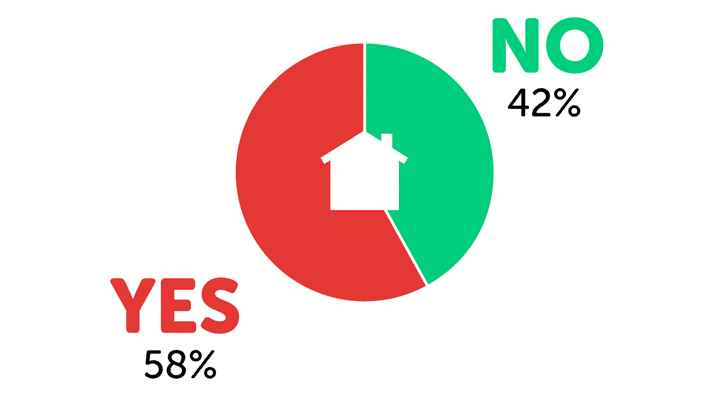
Around three in five students do need to borrow money for rent.
Here is where they borrow the money from:
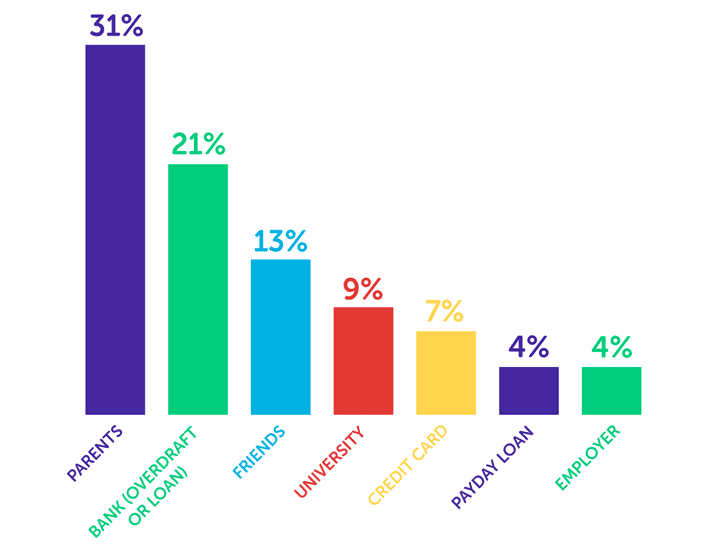
The most common way for students to borrow money for rent is from their parents, which nearly a third of students in the survey said they did. On top of this, 21% borrow from the bank, either in the form of an overdraft or a loan, while 13% borrow from friends.
How much do parents pay?
As mentioned above, just under a third of students in the survey borrow money from their parents for rent.
And among students in the survey who pay rent, they receive an average of £145.36 per month, or around £34 per week.
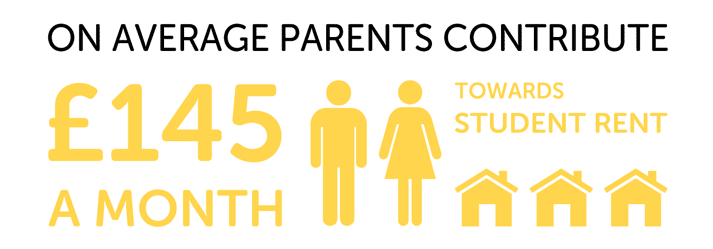
Comparing this to previous surveys, we have seen a noticeable drop in the amount of money students are receiving from their parents for rent.
Rather than the £34 per week that we're seeing this year, students were receiving an average of £44 per week in both 2022 and 2021, and £49 per week in 2020.
As students are receiving noticeably less money from their parents to pay for rent each week, this indicates the impact of the cost of living crisis on families.
With this added pressure on parents, we need to consider, again, how little the government is doing to support students.
Not only are many students unable to benefit from the £400 discount on energy bills, but it's also harder than usual for their parents to financially support them. And to make matters worse still, Maintenance Loans in England have fallen in real terms.
This leaves many students struggling to afford rent. For those that do borrow money from parents for rent, we've heard from some that they feel guilty and worried about the impact on their families.
Here's what students in the survey said about borrowing money from their parents:
- I have borrowed lots of money from my parents and feel extremely guilty about it. (Private landlord)
- [My] Maintenance Loan doesn't cover rent and [my] parents are unable to contribute. (Uni accommodation)
- My dad is ill and is working less and I have to work as well to help pay the rent. My Student Loan doesn't even cover half of my rent. (Private landlord)
- [I'm] lucky enough to have financial support. But I do worry about passing that strain onto my family. (Private landlord)
- I am one of three currently at university and feel awful when I have to ask my parents for rent and then when Student Finance finally comes in I send my mum £1,000 to cover as much as I can. (Private halls)
- I don't want to keep relying on my parents because they've got their own money problems. (Uni accommodation)
What issues do student renters face?
As well as facing financial pressures as renters, a lot of students report having issues with their housemates and the properties they live in.
Biggest problems with housemates
Here are the problems students in the survey have had with their housemates:
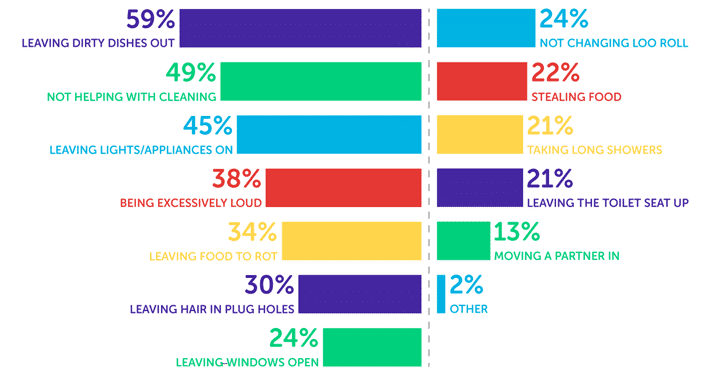
The most common issue is housemates leaving out dirty dishes, which around three in five have experienced. This is followed by people in the house not helping with the cleaning, affecting nearly half of the students in the survey.
And the third most common problem is when housemates leave lights or appliances on. The proportion of students struggling with this has increased significantly since last year, up from 33% to 45%.
This could reflect increased tensions around the use of energy in the home due to the rising cost of bills.
Biggest problems with properties
In terms of the properties students live in, these are the issues students in the survey have had:
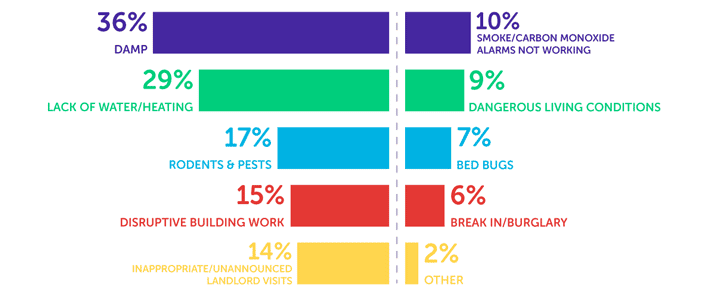
Damp is the issue that students are most likely to have with their house or flat. In the 2022 survey, 26% of students said they'd had issues with damp, but this has increased to 36% in this survey.
As we mentioned earlier, students are using their heating less on average than they had been last year. This could be contributing to the increase in the proportion of students dealing with damp in their homes.
Alarmingly, there has also been a steady increase in the proportion of students living in dangerous conditions over recent years. This is up from 5% in 2021, to 7% in 2022, to 9% this year.
How long does it take to get problems sorted?
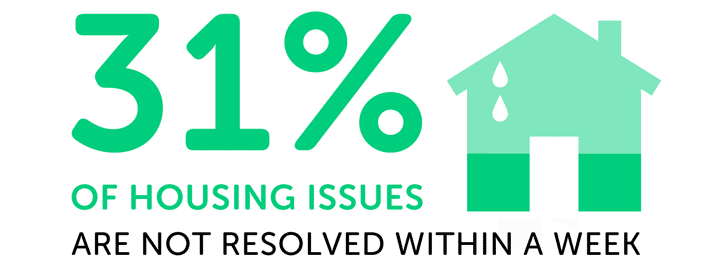
Among students that have had issues with their property, around a third said the problems are not resolved within a week.
Broken down, this includes 17% who said the issues are fixed within a month, 9% who said they take over a month and 5% who said they're not sorted at all.
On the other hand, 48% said their property's problems are dealt with within a week, while 21% said they're fixed within a day.
When students do face issues with accommodation, this is where they turn for help:
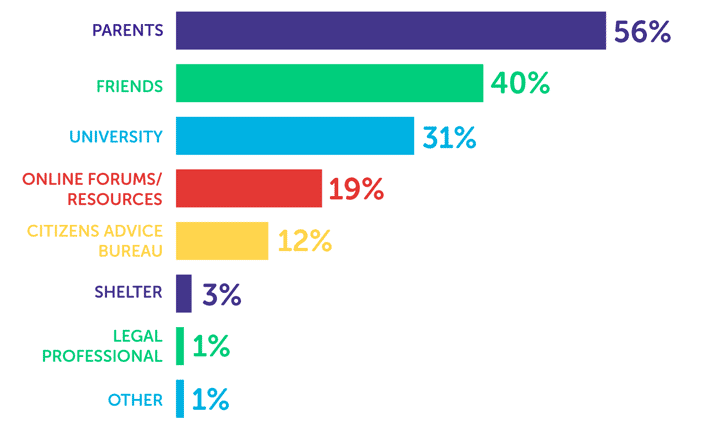
Most commonly, students will turn to their parents for accommodation advice when they need it.
Is student housing worth the spend?
As we have covered, the majority of students are struggling to afford their rent. So do they view their accommodation as good value for money?
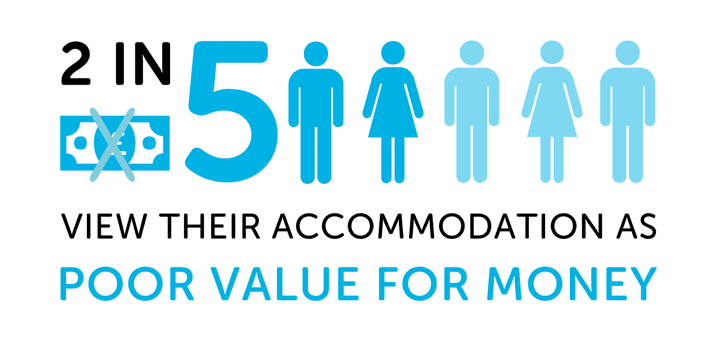
41% of students do not think their accommodation is good value for money. This proportion has increased since last year, when 35% had said the same.
Here's what some students said about the value for money of their accommodation:
- University is expensive and the accommodation is a con. I am supposed to be in catered accommodation but we don't get enough lunch allowance for the whole week and breakfast is not available for long enough in the morning. I have mould in my room and can't control my heating. (Uni accommodation)
- My bedroom walls are wet every morning, but we are told to keep windows open to stop this, but still keep the heating on too, but don't keep it on too long as we will be charged more. The house is forever cold and you can see the condensation in your breath every day. No attempt to fix the underlying issues is being made. (Private landlord)
- They make it so impossible to leave your accommodation, even if you have left your course. Student accommodation (especially private halls) is not remotely good value for money. (Private halls)
- The house is not worth the money. [There are] so many problems that aren't being resolved. (Private landlord)
- The cost of renting, given the poor value [for] money, combined with the stress of university has made me question if it's worth it. (Private landlord)
What others say about the survey
A Department for Education spokesperson said:
We recognise the impact that cost of living pressures have had on students, and are providing £276 million that universities can draw on to make hardship awards to disadvantaged students.
Kellie McAlonan, Chair of the National Association of Student Money Advisers (NASMA), said:
With housing costs making up the biggest expenses for students across the country, it is vitally important, particularly during this cost-of-living crisis, that we fully understand the challenges being faced by our students.
The National Student Accommodation Survey gives us the data needed to allow colleges and universities from across the country to better support students by understanding the challenges they are facing.
What we are seeing in the survey results should not be surprising. It's been evident for some time that students can often get the short end of the stick when it comes to having safe and affordable housing and many have lost out on some of the interventions the government has introduced to support consumers with record breaking energy bills.
The government need to consider that struggling to pay rent is a reality for many students, and it isn't good enough.
Core funding packages need to be good enough to support student success, safe and affordable housing shouldn't be a lucky find, and students shouldn't be left out in the cold during a cost-of-living crisis.
Student housing resources
These guides include info or advice about many of the topics covered in this report:
- National Student Money Survey
- Student rent calculator
- Help with energy bills – £400 energy rebate and more
- Cost of living crisis: 20 ways to cope
- Parental contribution calculator
- How to save money on rent.
About the National Student Accommodation Survey 2023
If you'd like to know more about the survey or receive expert comments, please get in touch.
You're welcome to reference or re-use data from the survey with credit and a link back to the site: "Source: The National Student Accommodation Survey 2023 / www.savethestudent.org".
The survey polled 1,869 people in the UK between 1st December 2022 – 23rd January 2023.








